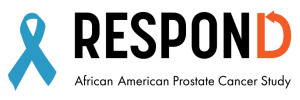The problem:
- African American men are about 75% more likely to be diagnosed with prostate cancer when compared with other ethnicities.
- African American men are more than twice as likely to die of prostate cancer.
RESPOND seeks answers by recruiting 10,000 African American men with prostate cancer to participate in this groundbreaking study to improve health equity for African American men and their families.
 This large study aims to identify the environmental and genetic factors related to disproportionately high diagnoses of aggressive prostate cancer in African American men. It has been established by the National Cancer Institute (NCI) and the National Institute on Minority Health and Health Disparities, as well as by the Prostate Cancer Foundation.
This large study aims to identify the environmental and genetic factors related to disproportionately high diagnoses of aggressive prostate cancer in African American men. It has been established by the National Cancer Institute (NCI) and the National Institute on Minority Health and Health Disparities, as well as by the Prostate Cancer Foundation.
RESPOND (Research on Prostate Cancer in African American Men: Defining the Roles of Genetics, Tumor Markers, and Social Stress) aims to recruit 10,000 participants. It will generate key biological and non-biological information that will help researchers reduce the rate of aggressive prostate cancer in African American men. The study will focus on those diagnosed after 2010.
RESPOND is not an interventional study; it does not provide treatment for men diagnosed with prostate cancer. Participants complete a survey and may be asked to provide a saliva sample and to allow researchers to obtain a small piece of tissue from a prostate biopsy or surgery that has already been performed.
Those interested in participating should visit www.respondstudy.org for additional information and to sign up.
Data collection will take place at multiple sites across the U.S.: in California at USC, UCSF, and the Greater Cancer Research Registry/Public Health Institute; in Houston at Baylor College of Medicine, in New Orleans at the LSU Health Science Center, in Atlanta at Emory, in Florida at Moffitt Cancer Center, in New Jersey at Rutgers and the NJ Department of Public Health, in Maryland at Johns Hopkins University and the NCI, and in Detroit at Wayne State University.









